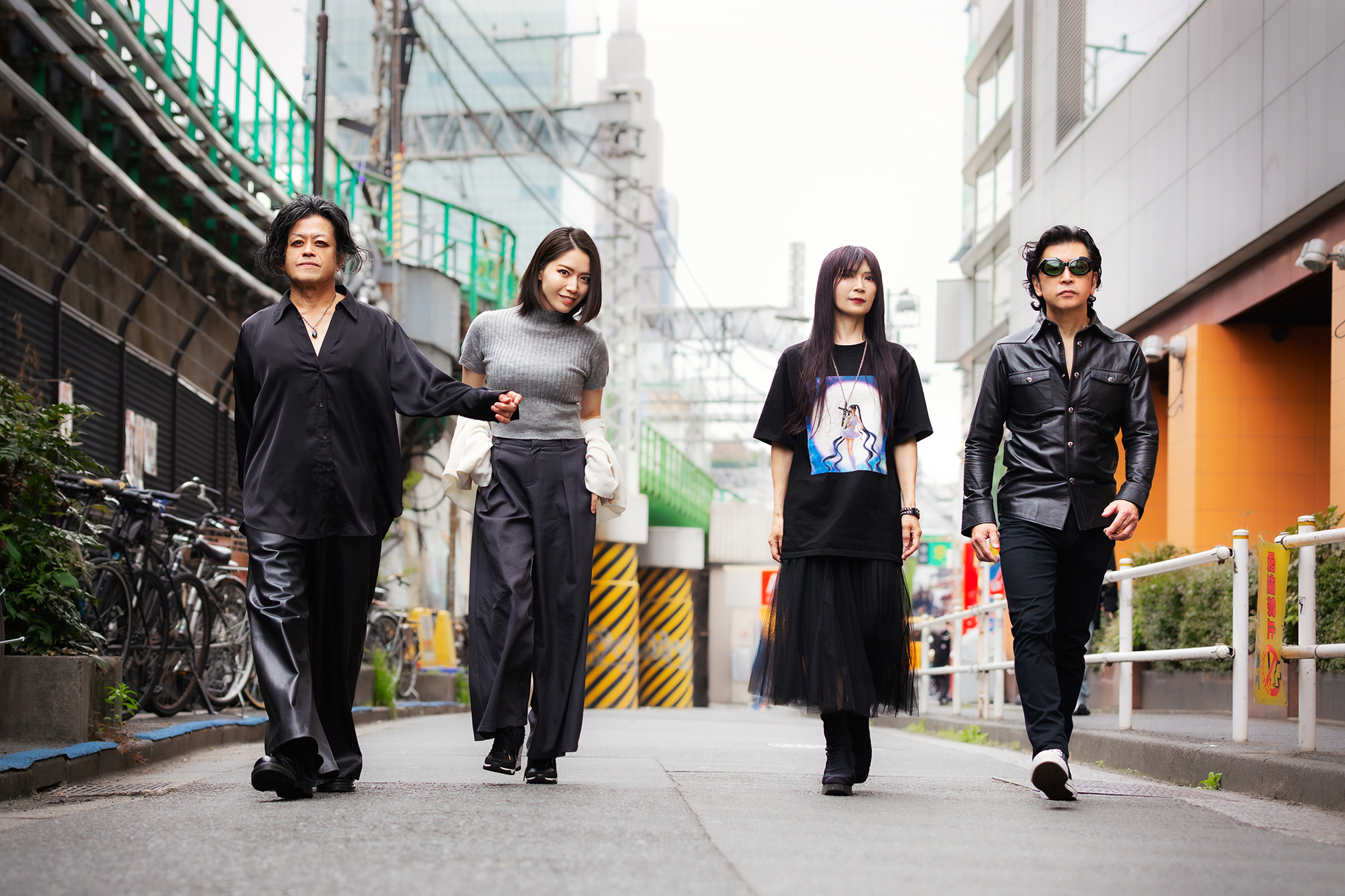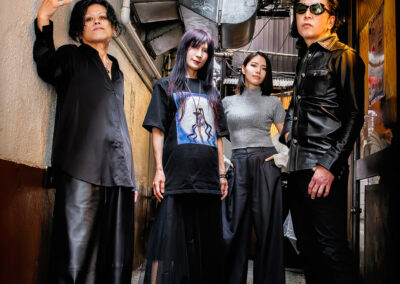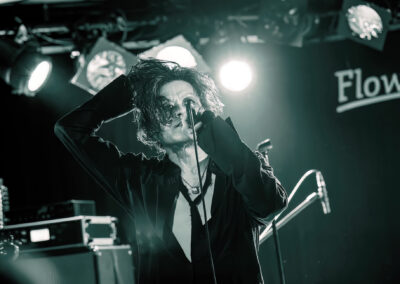Far-East Phallus Kicker is set to release their debut album titled META-ROMAN-SONIC on June 9th (2024), marking a significant milestone in their musical career.
Far-East Phallus Kicker is a dynamic Japanese band that masterfully blends the coolness of Post-Punk and Rock N Roll with the infectious energy of American rockabilly, all while retaining a deeply rooted Japanese essence. This unique fusion perfectly balances the old with the new. The band features vocalist Chuya (ALLERGY and De-LAX), guitarist and composer Hideki (De-LAX) and two powerhouse women: bassist ERY and drummer Reiko. With anticipation mounting, Far-East Phallus Kicker is set to unveil their debut album titled META-ROMAN-SONIC on June 9th (2024), marking a significant milestone in their musical career. Showcasing their distinctive sound and vision, the album promises to be a thrilling exploration of cultural fusion and sonic innovation. Released through their own label, Kyokutou Record, this album represents not only the culmination of their artistic expression but also a bold step forward into the global music scene.
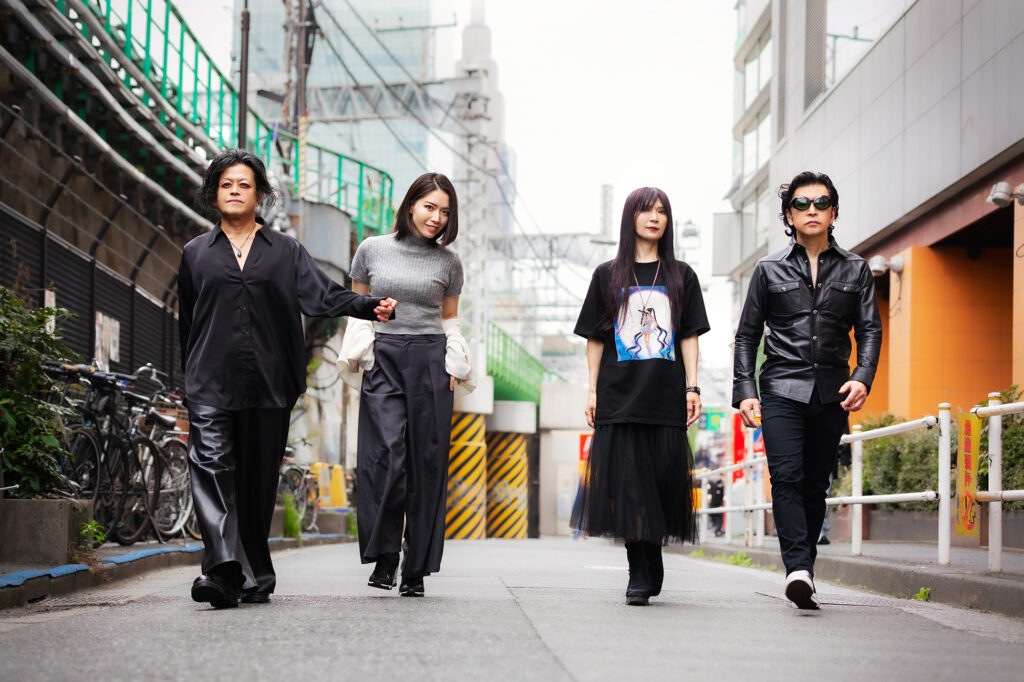
––What inspired you to start your own record label alongside the release of your debut album?
Hideki: Well, it really came down to the fact that there wasn’t anyone else taking the initiative! (laughs) We felt a deep-seated desire not only to share our music with the end user but also to personally ensure that our artistic vision reached them intact. We were determined to bypass any intermediaries and establish a direct connection with our audience. It was about more than just distribution; it was about maintaining creative control and forging a direct, meaningful relationship with our fans.
––For those who haven’t heard the album yet, how would you describe it?
Hideki: Yeah, what kind of description would you give?
Chuya: I would simply say it’s a Rock N Roll album. I was one of those who denied the Rock N Roll etiquette. I was born in an era where the history of Rock N Roll was still relatively young. Rock N Roll burst onto the scene in the 1950s, only to be relentlessly deconstructed and reinvented by the time the tumultuous 1970s rolled around. After years of playing in various rock bands, I’ve come to believe that we’ve managed to encapsulate the sheer brilliance and raw energy of 20th-century Rock N Roll in our own distinctive way. It’s a rock and roll album tailor-made for our generation. For those who have yet to delve into the soul-stirring world of Rock N Roll, lend us your ears and experience the magic for yourselves.
––Could you elaborate on the significance behind the album title META-ROMAN-SONIC?
Chuya: Certainly. The term meta carries connotations of going beyond, transcending. So, rather than simply dismantling the concept of rock and roll as we know it, our aim is to surpass it, acknowledging its presence and then moving beyond it. The word Roman signifies romance and love. As for sonic, it encapsulates our interpretation of Rock N Roll, its essence and energy. To be more specific, sonic embodies Hideki’s contribution, while roman represents mine. Together, we aspire for these elements, alongside Reiko and ERY, to transcend. We want them to exceed what we’ve accomplished, reaching new heights that are truly meta.
Hideki: That’s quite profound (laughs).
––What were some of the major challenges you faced during the creation of the album?
Chuya: I want to hear about it from the meta members. Reiko and ERY, speak up!
Reiko: One of the most challenging ventures for us was experimenting with brand-new songs during our practice sessions, ones we had never performed live before. It was a first for our band. Unlike our previous CDs where we included songs from our live repertoire, this time around, it was a completely fresh endeavor for us.
ERY: Yes, exactly. Roughly half of the tracks were familiar ones we’d played live, but for the remainder, it was the first time we brought them to life in the recording studio. It added an intriguing and challenging dynamic to the process.
––Do you have any anecdotes regarding the recording process?
Reiko: Surprisingly, it wrapped up quite quickly, didn’t it?
ERY: We split the recording sessions between December and January, tackling half of the tracks in each month. But right now, I can’t recall any particularly interesting anecdotes…
Chuya: Looking at it from the lyricist’s standpoint, the songs recorded in December already had lyrics, as they were tunes we’d performed live. However, for the ones we hadn’t showcased live yet, we were still fine-tuning the lyrics in January, so there wasn’t much of a New Year’s break for us.
Hideki: And let’s not forget about the snacks. They seemed to multiply during the recording sessions (laughs).
ERY: Ah, yes. It’s inevitable to snack while recording. It’s a tradition, isn’t it?
Hideki: It is (laughs)!
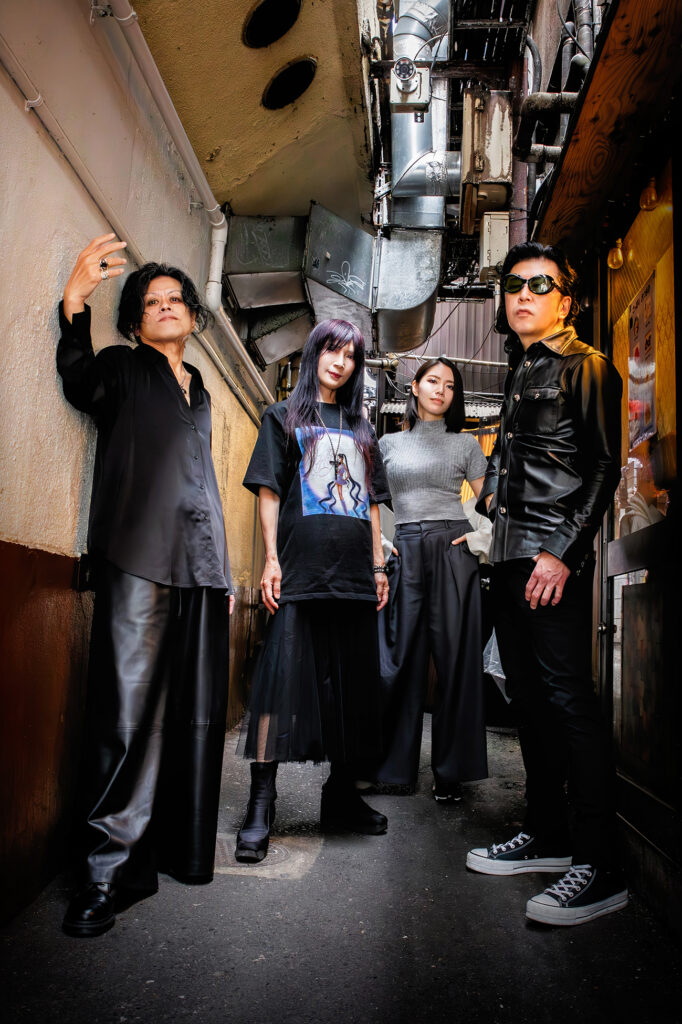
––I’d like to talk about some of the themes in the new album. It starts with the track A Bout de Souffle. Did French cinema serve as inspiration for this piece?
Chuya: Absolutely. At the outset, being a full album, there’s a thematic thread running through it. But even before that, there’s a subtle hint of it. That chord progression is essentially the album’s theme song, isn’t it?
Hideki: The bassline of the track is the same for the track Far East Phallus Kicker theme. However, for the first track, we infused it with a bit of bounce. It’s about emphasis and unity, capturing a sense of something you might hear in the outdoor ambiance, inspired by the vague theme Chuya provided.
Chuya: It was refreshing to discuss it amid the bustling streets while Hideki and I strolled back from the studio to Koenji station. It added depth to the imagery.
Hideki: I bid him “good luck” and made a swift exit (laughs).
Chuya: Once the piece was complete, the imagery of the Nouvelle-Vague came to mind, prompting us to choose the title.
Hideki: I must mention that, it is Mandah who is featured on this track, and I want to extend my gratitude for lending us your voice. Your contribution was fantastic! Your voice truly elevated the piece.
––Thank you very much.
Chuya: After parting ways with Hideki, I felt the urge to add some words or lines, but I wanted to steer clear of anything overly specific in Japanese. So, I reached out to Mandah, sending her a note along the lines I wanted to incorporate in the song. She promptly sent back a voice memo, and when I inquired about using it on the CD, she replied: “Well, then let me redo it properly” (laughs).
ERY: Now that’s dedication.
Hideki: It was like having a professional actress on board. The overall quality of the song skyrocketed. So, thank you very much.
Reiko: It built the atmospheric feel.
––Oh! Thank you for trusting me.
Continuing, it’s evident that the Showa Period left a significant imprint on tracks like Far-North Romance and Kyokutou Phallus Kicker’s Theme. Could you provide more insight into the inspiration behind these songs?
Hideki: Certainly. Our creative process for this album, including its artwork and musical direction, was heavily influenced by spy movies and television series. Kyokutou Phallus Kicker’s Theme has been a part of our repertoire for a while, originally covered during our early conceptual stages. During that time, we were exploring the vibrant music scene of 1960s Japan, particularly inspired by bands like the Golden Cups. We found ourselves drawn to the energy and style of that era, incorporating its essence into our music. It felt like a natural progression, a homage to a pivotal period in Japanese music history.
Chuya: Absolutely. At the album’s inception, we felt a nostalgic pull from the Showa-era, yet with a fresh perspective as we entered the Reiwa-era. Initially, our sound evoked the dynamic spirit of bands like the Golden Cups. We even incorporated theme songs from classic Showa-era action dramas as part of our sonic palette, setting the stage for our musical exploration.
––What specific elements of the Showa era inspired you the most?
Reiko: For me, it was shows like Key Hunter and the early works of Sonny Chiba.
Hideki: Ah, those iconic dramas. Yes, indeed. Sonny Chiba in his prime was unforgettable and Key Hunter was a staple of Showa-era television.
Reiko: There was a distinct flavor to Showa-era spy dramas and action-packed series that could really capture our imagination.
Hideki: Absolutely. Directors like Quentin Tarantino have been undoubtedly influenced by their style and energy.
––Oh, when I listened to Kyokutou Phallus Kicker’s Theme, it immediately brought to mind Tarantino’s signature cinematic style.
Hideki: Exactly. Tarantino has drawn inspiration from Japanese culture.
––The new album reflects a refreshing perspective on love, one that transcends the confines of traditional gender norms. Could you enlighten us with the captivating narratives behind Gestaltzerfall and Alien Beauty?
Chuya: Gestaltzerfall deals with the profound notion that love knows no bounds when it comes to gender. While this concept may not immediately strike as humorous, its charm lies in the subtle realization of its implications. The title itself, Gestaltzerfall, evokes a sense of perplexity, akin to staring at something for so long that it becomes increasingly elusive, mirroring the experience of contemplating the intricate strokes of kanji characters until their structure becomes blurred. The song challenges societal conventions by suggesting that love persists regardless of conventional male-female distinctions. Alien Beauty takes a playful approach, weaving in elements inspired by the life of Shohei Ohtani, a renowned Japanese baseball player. The lyrics utilize baseball terminology, metaphorically exploring the idea of throwing curveballs and straight pitches. Beyond its playful façade, the song serves as a commentary on transcending the limitations of the past, particularly the Showa era’s perception of foreigners as enigmatic beings, often equated with extraterrestrial entities. By drawing parallels to Shohei Ohtani’s global success, the song celebrates diversity and challenges preconceived notions of foreignness. While not directly linked to conventional beauty or romance, Alien Beauty prompts listeners to contemplate the fluidity of identity and the arbitrary nature of societal categorizations. It’s a subtle yet strong reminder that love, like the curveballs in baseball, defies expectations and thrives in unexpected moments.
––The genesis of the song Love Misery is said to have emerged from Chuya’s most profound struggles. Could you elaborate on that?
Chuya: Indeed. This song has been with us since the earliest stages of the band. Initially, it existed as a melody without being formally recorded. It was born during a period of intense introspection, where I found myself grappling with despairing emotions. But, after undergoing multiple recording sessions, the lyrics underwent several revisions. It wasn’t until the day before our final recording session that we decided to add Love (Ai) to the title, transforming it into Love Misery. The decision to include Love (Ai) was made on the actual day of recording. I felt it was essential to infuse a subtle glimmer of hope amidst the darkness conveyed in the song’s lyrics. The song Misery is reminiscent of the Showa-era ballad Yokohama Tasogare. This iconic song, composed by lyricist Yoko Yamaguchi, is renowned for its unconventional approach, consisting of a series of evocative words such as Yokohama, dusk, small hotel room, kiss, lingering scent, and cigarette smoke.
Hideki: Ah, it’s by Hiroshi Itsuki.
Chuya: Exactly. The composition of Yokohama Tasogare was a big influence. Similarly, Misery adopts a similar approach, juxtaposing words commonly associated with Visual-Kei aesthetics.
Hideki: Ah, now it makes sense! I see the connection.
Chuya: The essence of grappling with despair and darkness, like drowning in the depths of the night (laughs).
––The final song of the album, Orphée the August God, holds immense significance as a tribute to ISSAY. Its title draws inspiration from Orpheus, the legendary musician and poet famed for enchanting both people and animals with his music. Can you tell me more about it?
Chuya: Actually, the song was born from a vivid mental image I had during his funerals. ISSAY was known for his sunny disposition, but on the eve of his funeral, it rained, and I couldn’t help but feel responsible. It’s a bit ironic, considering I’m often associated with rain. Nevertheless, on the day of his funeral, the weather cleared beautifully, almost as if the heavens were expressing gratitude. That scene struck me deeply, and I felt compelled to immortalize it in a song, with Hideki crafting the melody. This period was pivotal for us, as I felt a strong inclination towards embracing Rock N Roll. Hideki shared this sentiment, desiring to pursue his unique version of the genre. Amidst personal turmoil and uncertainty, these positive Rock N Roll tracks flooded my mind—five of them, to be precise. It was initially overwhelming, but their arrival during such a tumultuous time made me realize the album’s significance and our fortune in completing it.
Hideki: Indeed, the timing of when I handed over the demo tape seemed almost fateful, aligning closely with ISSAY’s passing. It required mental preparation, given the circumstances.
ERY: When we entered the recording studio, we discovered Chuya’s lyrics. Initially, my placeholder lyrics were quite positive, influencing the instrumental arrangement. Orphée evolved into a poignant yet uplifting piece, though its original placeholder lyrics were unexpectedly about marriage—something we never intended to reveal. Their unwavering positivity guided our musical direction.
Hideki: Chuya was navigating personal challenges around the time we started recording, which coincided with the album’s creation. We patiently awaited the right moment, resulting in exceptional lyrics.
Reiko: Chuya’s heartfelt lyrics had a profound impact, inspiring us to convey his emotions authentically. Each song carries deep meaning, making the creative process incredibly fulfilling.
Chuya: That gap motivated me. Despite using the same chord progressions and rhythms, different musicians inevitably create unique music. That’s the essence of being in a band. So, even with identical lyrics, each rendition offers a distinct musical experience. Recording the rhythm track while I was still writing was a testament to that diversity. This experience was enriching, I guess.
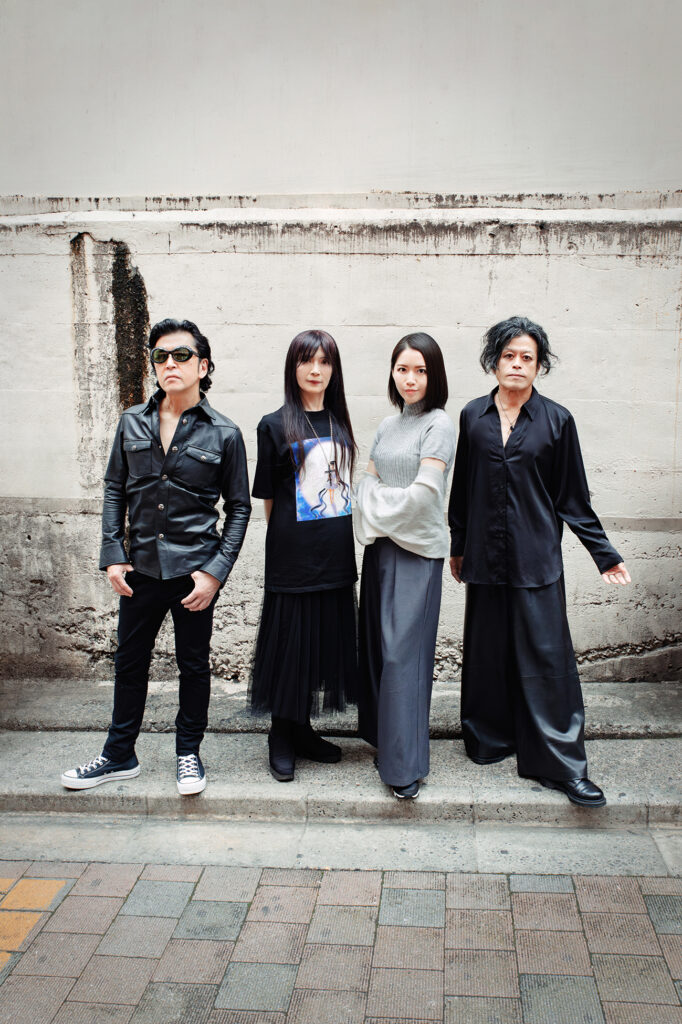
––Please share your favorite songs.
Reiko: My favorite is Deus. I’ve loved it since I first heard the demo. It’s catchy and really resonates with me. It paints such vivid imagery in my head when I listen to it.
ERY: I’d go with Deadhead Pierrot. It has this happy vibe that uplifts your mood. Since I often travel alone, it’s a perfect song for when I’m exploring different countries or walking through various landscapes.
Hideki: For me, it’s Orphée. It’s quite personal to me. It wasn’t like I deliberately focused on the guitar solo, but I thought, let’s keep it short. That’s been my recent approach too. There was a flow to it. I felt this strong urge to play from the interlude to the end again, which I hadn’t done before. It holds a special place for me. I feel like a guitar hero when I play it… Oops, I said it! (laughs)…
Chuya: I can’t pick a favorite. OK… Building on what ERY said, Deadhead Pierrot was actually the last song to be completed, right? I had a hard time whi this one. The lyrics were finalized last. I honestly didn’t like it much at the beginning and I was a bit stuck… But eventually, I was able to embrace it. It was completed at the very last minute.
Hideki: My aim was for Chuya to sing that typical rock ‘n’ roll song, but it would always end up sounding unique.
Reiko: Rock N Roll? To me, the song has… a circus vibe (laughs).
Hideki: Basically, it doesn’t fit into one category (laughs).
––After five years, how do you perceive the band’s evolution?
Hideki: I’d say the band has truly come into its own. We’ve not only matured individually but also in terms of our musical style and cohesion as a unit. The tours we’ve embarked on have been instrumental in solidifying our bond as a band. As a result, there’s a newfound sense of trust and camaraderie among us.
ERY: Absolutely, the tours have been transformative. It’s not just about the live performances; it’s the shared experiences during travel that have allowed us to uncover different facets of each other’s personalities. It’s really cool and interesting to see the contrast between our public personas and our true selves. I feel like Chuya has remained remarkably consistent, at least in my eyes. My initial impression of him hasn’t wavered since day one. But Reiko is a whole other story (Laughs)! She exudes this cool, composed aura while drumming, but behind the scenes, she’s more like the carefree, forgetful youngest sibling (laughs). Nonetheless, these revelations have allowed us to connect on a deeper level, free from any facade. Our interactions feel more genuine and effortless now.
Hideki: Thank you for sharing this. That was an interesting take.
––Looking towards the future, what are the aspirations and objectives you have set for the band?
Hideki: Band’s objectives! There are plenty of them, so it’s hard to choose just one.
Chuya: Well, our goal is for everyone to have their own individual aspirations and objectives. If we all shared them openly, it might cause conflict and derail our progress. So, I think it’s better for each of us to have our own ideals for the band.
Reiko: Right, we shouldn’t impose them on each other.
Hideki: Alright, let’s keep our personal aspirations private, then. But that’s not cool for Mandah so let’s say that for the label, our goal is to reach 10,000 copies for the upcoming album. But even if we hit 1,000 we’ll be happy. Let’s do our best to reach that realistic goal.
Chuya: But you know, five years now, it’s different from when we were younger. Time flies by so quickly. The world is changing rapidly, and amid all that, the music we create naturally reflects our individual goals and aspirations. It’s not just about the words; it’s about the resonance. So, our goal is to cherish each sound we produce together and move forward step by step. When one of us advances, if there’s resistance or reluctance, it hinders our progress. Let’s enjoy the days as they pass. I wrote the lyrics of this album as if it were my last production. Embrace each day as if it were your last.
Hideki: That’s beautiful.
––Thank you for this interview. I wish you all the success you deserve.
FEPK: Many thanks.
__________________
Mandah FRÉNOT
(c) VMJ

